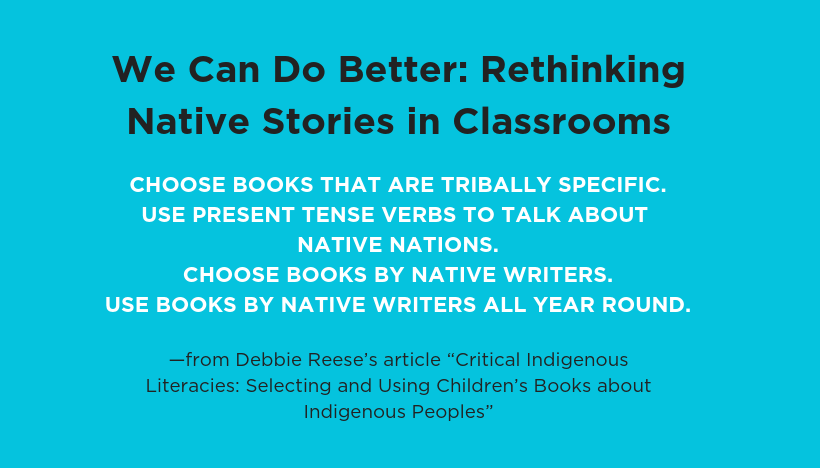Today's blog post has an unusual title. It is my effort to reply, in one response, to the range of queries I get by email. These are emails that give me hope. They embody a growing understanding that Thanksgiving, as observed in the U.S., is fraught with problems.
Those problems range from the stereotyping of Native peoples to the pretense that peoples in conflict had a merry sit-down dinner.
Some emails are from parents who are dismayed when they visit their library and see children's books filled with those stereotypes and pretenses. These parents want their children to learn the truth. So they turn to the library for help.
Some parents tell me that, in a previous year, they had talked with librarians about the problems in the books. These parents felt hopeful that the librarians understood and would provide different kinds of programming and displays this year but that doesn't happen. Others tell me that the librarian interprets their questions as efforts to censor books. Some get lectured about censorship.
The thrust of the emails is this: what can I do?
Those of you who are writing to me have already taken the first step, which is to know there's a problem. Others have to know that, too. In order for changes to happen, more people have to understand what you already know. There is a problem. So, talking with friends and colleagues about it is a second step. Some of you already do that, which is great. Keep talking! And use social media! Though there are valid concerns about the merits of social media, I think it is why so many towns, cities, universities, schools, and states have instituted Indigenous Peoples' Day instead of Columbus Day.
With that in mind, I'm sharing a terrific resource that is available, online, at no cost.
Titled "Origin Narrative: Thanksgiving," it is a free teacher's guide to be used by people who have bought a copy of
An Indigenous Peoples' History of the United States for Young People but I think people can use it without the book.
A brief note: In 2014, Dr. Roxanne Dunbar-Ortiz's
An Indigenous Peoples' History of the United States was released by Beacon Press. Teachers asked for a version that they could use with teens. Beacon asked if I would do it; I invited my friend and colleague, Dr. Jean Mendoza, to do it with me, and it was released in 2019, with "For Young People" as part of its title.
Here's a screen capture of the lesson plan. To download it, go to Beacon's website where you can see the
webpage of it and the link to download a
pdf. You can ask your library to get the book, and if you have the option, see if you can schedule one of the library's meeting rooms to have a conversation with others about the holiday.
I welcome other thoughts. What strategies have you used that seemed to help?
****
Ah! Meant to include a bit more. Some people write to me asking for Thanksgiving books that I recommend they use with children. My impulse is to offer some suggestions, but I am also trying to remind them and myself that the question is, in essence, one that centers the holiday itself. It seems to recognize that stereotyped and erroneous storylines are not ok, but it still wants Native peoples at that table.
Instead of providing a list of books that can be used for this week, I am asking that you use books by Native writers, all year long. Don't limit our existence to this holiday.
In the Best Books page here at AICL, you'll find lists that I create, and links to the pages about the Youth Literature Awards, given by the American Indian Library Association. I've also written several articles that are available online. Some are about books I recommend, and some are ones that invite you to think critically about books. Here's the links. They work right now but journals don't keep articles available this way, long term. You might have to ask your librarian for the article if a link no longer works.








